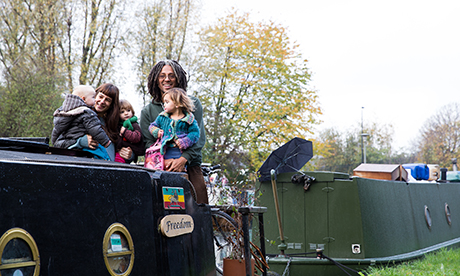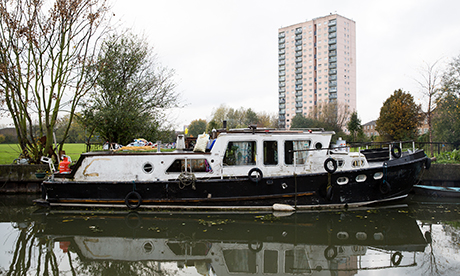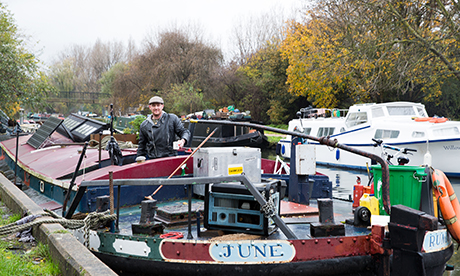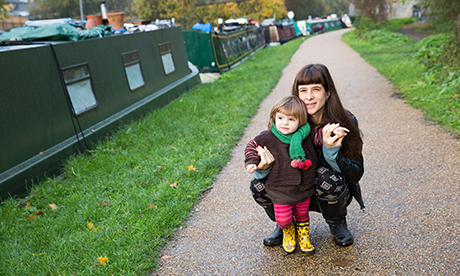No moor room: canal boat families fight for their own stretch of water on River Lea

Members of Hackney Boating Families: Cecilia Bonilla and Jason Makepeace. with Laser, Agatha and Santia. Photograph: Eleonore de Bonneval
It is not just a cheap way out of the housing crisis,” says Damian Walsh as he points towards the linear village of canal boats snaking up the River Lea towards Stratford on a damp wintry morning.
“If you get it wrong, you’re sitting round a candle with no power or walking down the towpath with wheelbarrows full of wet logs.”
Damian lives on ‘June’ a lovingly restored wide-beam canal boat currently moored in Hackney, with his partner Giuilia Di Patrizi and their 6-year-old son Morgan.
They are part of Hackney Boating Families, a group of seven ‘continuous crusier’ boats holding licences which mean the boats must be moved every 14 days.
Once content with this nomadic lifestyle, these boaters are now seeking to create a community moorings – a home moorings managed as a cooperative – on the River Lea.
The group made an application in June to moor permanently on the offside (non-towpath) of a stretch of river at the bottom of Daubeney Road in Lower Clapton.
The land is owned by Hackney Council and the water by the Canal and River Trust (CRT) – the year-old charity which controls over 2,000 miles of waterways in England and Wales.
But the application has made little progress. The CRT says the site is already being bid for by another group, Daubeney Green Mooring Project, but Hackney Boating Families claim the CRT is “dragging its heels” and that communication has broken down.
Figures by the CRT show that since 2011 the numbers of boats without home mooring has doubled on Regent’s Canal alone. In 2011 there were 120, in March this year it surpassed 250.
CRT’s London Liaison Officer Sorwar Ahmed says the increase in boaters is putting undue pressure on waterways “not really designed to accommodate floating communities”.
The families say the increase in boaters has brought stricter enforcement of the 14 day rule. Jason Makepeace, a seasoned boater with over 10 years experience said the authorities used to be “far more lenient”. “I need a space to moor my boat, where I don’t keep getting text messages from CRT telling me to move on,” he said.
Boating groups have also criticised the CRT for their “aggressive” enforcement. Pamela Smith, chair of The National Boating Travellers Assocation said that Hackney Boating Families should not be “harassed into taking permanent moorings”.
Canal children
Raising children on a floating home is not easy at the best of times but constantly moving the boats makes life difficult for families with children who need to attend school.
“Don’t let the heat out”, instructs Giuilia Di Patrizi as she ushers me into her boat. She explains that having nowhere to moor makes family life hard.
“Hackney Wick was tough,” she says, “There was only one small supermarket, expensive cafes where two pancakes cost £14, noisy late night canal-side bars and a lack of facilities”.
The crackdown on continuous cruisers has contributed to higher-than-ever demand for permanent moorings – and in a crowded market, they’re not cheap. The CRT sells its mooring vacancies to the highest bidder through an auction system.
Ian Shacklock, Chair of Friends of Regent’s Canal said he was “horrified” when he found out how the moorings were allocated: “Apparently anyone can just wade in with enough money and gazump the others. It will come down to who will pay more.”
Word on the Water, London’s only floating bookshop, recently lost out on a home moorings near Paddington in favour of an application from wealthy real estate company British Land.

A canal boat in front of Daubeney Fields where the boaters hope to secure a moorings. Photograph: Eleonore de Bonneval
Sorwar Ahmed said that while the CRT wants to find ways of embracing proposals like that of Hackney Boating Families, at the moment it “cannot differentiate” between social and commercial projects.
Down on the Lea, the boating group feel that the CRT is struggling between its new identity as a charity and its more familiar guise as a transport authority responsible for issuing notices, fixing leaks and mending bridges.
The charity says its priority is to continue to “make the experience of living on the canal and using the waterways as good as can be.” But, adds Ahmed, “we are not a housing authority and housing is not one of our charitable objectives”.
“Yes, to some extent the facilities haven’t kept pace, but to what extent should all these facilities be keeping up with demand when actually it is a housing need, not a boating need per se?”
However, the boaters are unconvinced. “They look me in the eye and say ‘we are an environmental charity, we are not landlords’, says Giuilia, poking her head through the hatch on her barge, “but is this is so then why is the nearest rubbish bin in Hackney Wick?”
“The canals are filthy. The seaweed will wrap around your propeller, there are sofas, springs, car seats, large saris… the amount of rubbish is insane. You only want to provide services fine, provide them.”
Giulia insists that collateral damage of an oversaturated houseboat market will fall on the CRT regardless:
“The CRT are going to have to face the problem as lots of new families are going on to the river. Their answer can not just be ‘tough luck’.”


